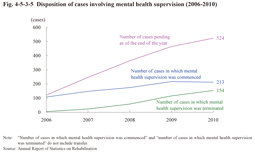4 Treatment within local communities
Those who have received a decision on a need for outpatient care or a permission to be discharged from a hospital by a court then need to receive outpatient medical treatment at a designated outpatient care hospital (as designated by the Minister of Health, Labour and Welfare) for three years, in principle, and are placed under mental health supervision by probation offices during that period. Mental health supervision aims to ensure continued medical care for the subject persons, and to enable the rehabilitation coordinators to give the necessary guidance and advice for it and supervise their hospital visits and living conditions through interviewing them and receiving reports from the relevant agencies.
In implementing mental health supervision, probation offices cooperate with designated outpatient care hospitals and prefectural/municipal mental health and welfare institutions in formulating individual treatment plans for the subject person. The treatment plans include the content on and how to receive the necessary medical care, mental health supervision, and assistance, etc. in their local communities. More concretely, in addition to the goals of providing the appropriate treatment within their local communities and the desires of the subject person, the treatment plans also include: outpatient medical care, care visits, and day care schedules for medical care; how to contact the subject persons, etc. for mental health supervision; and the content of and how to receive the available mental health and welfare services, etc. as assistance. Based on the treatment plans the respective relevant agencies cooperate with each other in thereby implementing the appropriate treatment.
In addition, and according to the progress of the treatment, probation offices hold “care meetings” consisting of staff members of the relevant agencies in thereby sharing information on the implementation status of the treatment, etc. and standardizing the treatment policies. The treatment plans are reviewed when necessary.
Fig. 4-5-3-5 shows the disposition of cases involving mental health supervision. The number of cases in which mental health supervision was commenced in 2010 (excluding cases received by transfer) was 213 (of which the number of cases disposed with permission to be discharged was 151) and that pending as of the end of the same year 524.
Fig. 4-5-3-5 Disposition of cases involving mental health supervision (2006-2010)
Termination of medical care excluding completion of the term and rehospitalization in a designated inpatient care hospital are determined by a court through a hearing. In 2010, 56 decisions to terminate medical care and five decisions to rehospitalize subject persons were made (Source: Annual Report of Judicial Statistics).
